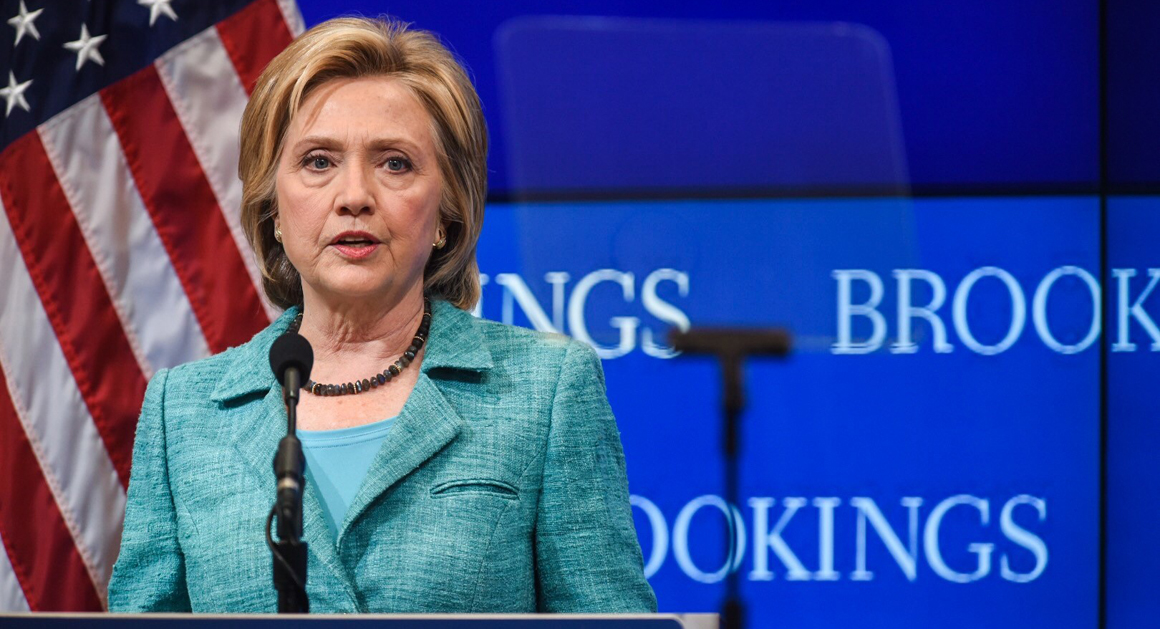
Hillary Clinton's speech on Wednesday shook a clenched fist at Iran. But it was also a warm embrace of another country: Israel.
Speaking at the Brookings Institution, Clinton strongly backed President Barack Obama’s nuclear deal. But beyond her largely familiar arguments in favor of the agreement with Tehran was a striking emphasis on Israel's security, which Clinton firmly vowed to protect.
Indeed, Obama's former top diplomat pledged a fresh start to the troubled relationship between the U.S. and Israel. Without ever quite calling Obama less than a rock-solid ally, Clinton implied that she would be a better friend to Israel.
"I wouldn't support his agreement for one second if I thought it put Israel in greater danger," she said. "I know well that the same forces that threaten Israel, threaten the United States. To the people of Israel, you will never have to question whether we are with you. The United States will always be with you."
She vowed, for instance, to invite the Israeli prime minister to the White House “during my first month in office.”
Such talk may only be the beginning for a candidate looking to woo Jewish voters and donors distressed by Obama’s combative public relationship with Israel’s government.
Clinton's plan to sell her Iran position will include a good deal of talk about her support for Israel, said a longtime aide who worked with Clinton on foreign policy issues and remains in touch with the candidate. That's not just campaign posturing: As Obama’s top diplomat, Clinton was always a notch to the president’s right on Israel, particularly when it came to tense peace talks with the Palestinians.
“The fundamental thing is she’s always felt you want to be very careful about allowing there to be a public gap between us, in part because it strengthens Israel’s enemies and ultimately isn’t good for our deterrence as well,” said another former aide, Dennis Ross, a senior official who handled Middle East policy at Clinton’s State Department and then at the Obama White House. “Not that you can’t have disagreements. But I think she prefers to keep them managed and more quiet.”
Early in his first term, Obama pressured Israeli Prime Minister Benjamin Netanyahu to freeze West Bank settlement activity — a U.S. policy shift that angered the Israeli leader and soured their relationship from the start.
Clinton was skeptical of the settlement freeze strategy, according to former administration officials. She hinted at that view her 2014 memoir, "Hard Choices," in which she recalled being “worried we could be locking ourselves into a confrontation we didn’t need.”
In his first term, Obama’s senior advisors were divided between those who wanted to pressure Netanyahu into concessions — like an early settlement freeze to kick off a new round of peace talks — and those who argued the Israeli leader would respond best to reassurance and gentle handling. Clinton was in the latter camp.
“Had she been a complete free agent” during her administration tenure, “she would have managed it a little differently,” Ross said.
Since Clinton’s departure from the State Department at the end of 2012, Obama’s relationship with Netanyahu has further deteriorated. Netanyahu has bitterly opposed the nuclear deal and infuriated the West Wing with a March address to Congress criticizing Obama’s diplomacy with Iran that was coordinated with House Republicans.
Obama was further enraged by Netanyahu’s comments in the closing days of Israel’s March election suggesting that he would never make peace with the Palestinians and, in the view of the White House, employing racist rhetoric about Israeli Arabs.
In part as a response, the Obama administration might back United Nations action this fall pressuring Israel to accept a land-for-peace agreement with the Palestinians.
Although she is gently putting distance between herself and Obama on Israel, pro-Israel leaders generally consider her own credentials to be solid.
Clinton did anger Jewish leaders late in her husband’s presidency after she kissed the cheek of Sufa Arafat, the wife of Palestinian Liberation Organization leader Yassir Arafat, at a 1999 event in Ramallah. Mrs. Arafat had just delivered a speech accusing Israel of gassing Palestinian children. Clinton later said the kiss was a formality and that she had heard a milder version of the remarks in her headphones.
But most prominent pro-Israel leaders feel Clinton more than compensated for that flap as a senator from New York, when she was among Israel’s strongest advocates in Washington.
Those leaders do grumble, however, about the role of her longtime adviser Sidney Blumenthal that was revealed in recently released State Department emails. The journalist and former Clinton White House aide often sent Clinton negative opinions about Israeli policy, including articles by his son Max, a journalist harshly critical of Israel’s Palestinian policies.
Clinton aides are counting on her strong emphasis on Israeli security to count most.
Clinton’s speech addressed Iranian policies that threaten Israel — including Tehran’s support for the Lebanese militant group Hezbollah — and threatened to use military force against Iran should it attempt to develop a nuclear weapon.
“As president, I will take whatever actions are necessary to protect the United States and our allies,” Clinton said. “I will not hesitate to take military action if Iran tries to obtain a nuclear weapon.”
In a conference call after Clinton’s speech hosted by her campaign, Nicholas Burns, a former undersecretary of State for political affairs in the George W. Bush administration, said that Clinton’s threat to use force if necessary would be bolstered by a stronger relationship between the U.S. and Israel.
“For strategic deterrence to work, the Iranians have got to believe the U.S. and Israel are united,” Burns said.
“We’re not united right now,” Burns added. “I think the steps laid out by Secretary Clinton would bring us there.”
- Publish my comments...
- 0 Comments
